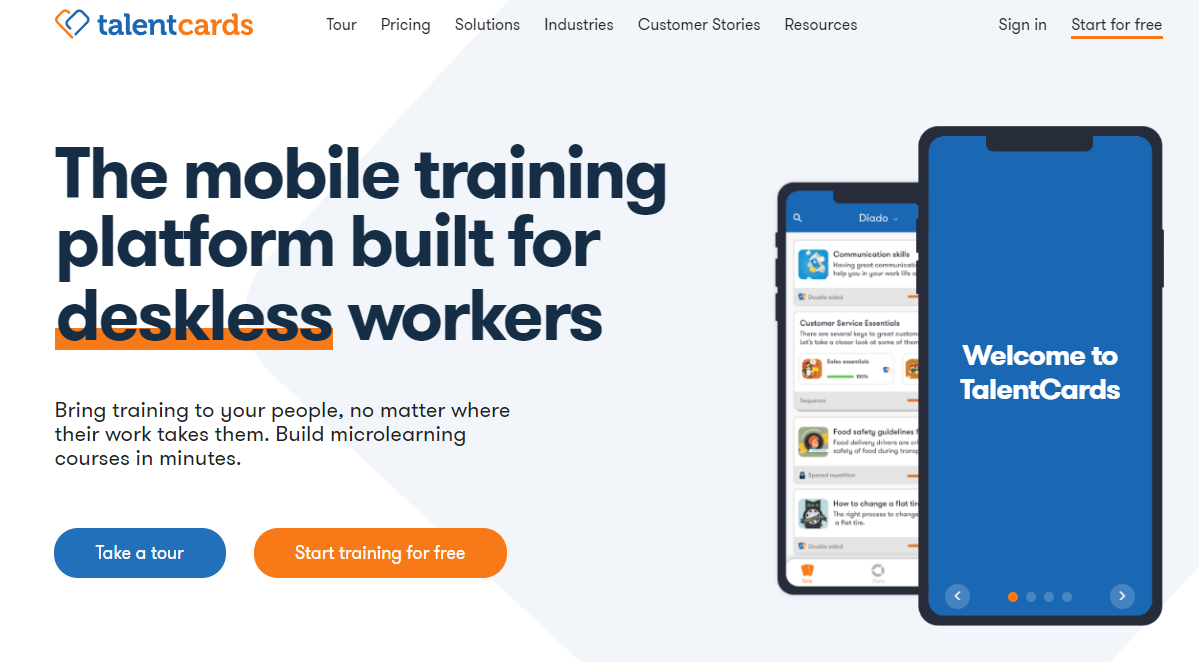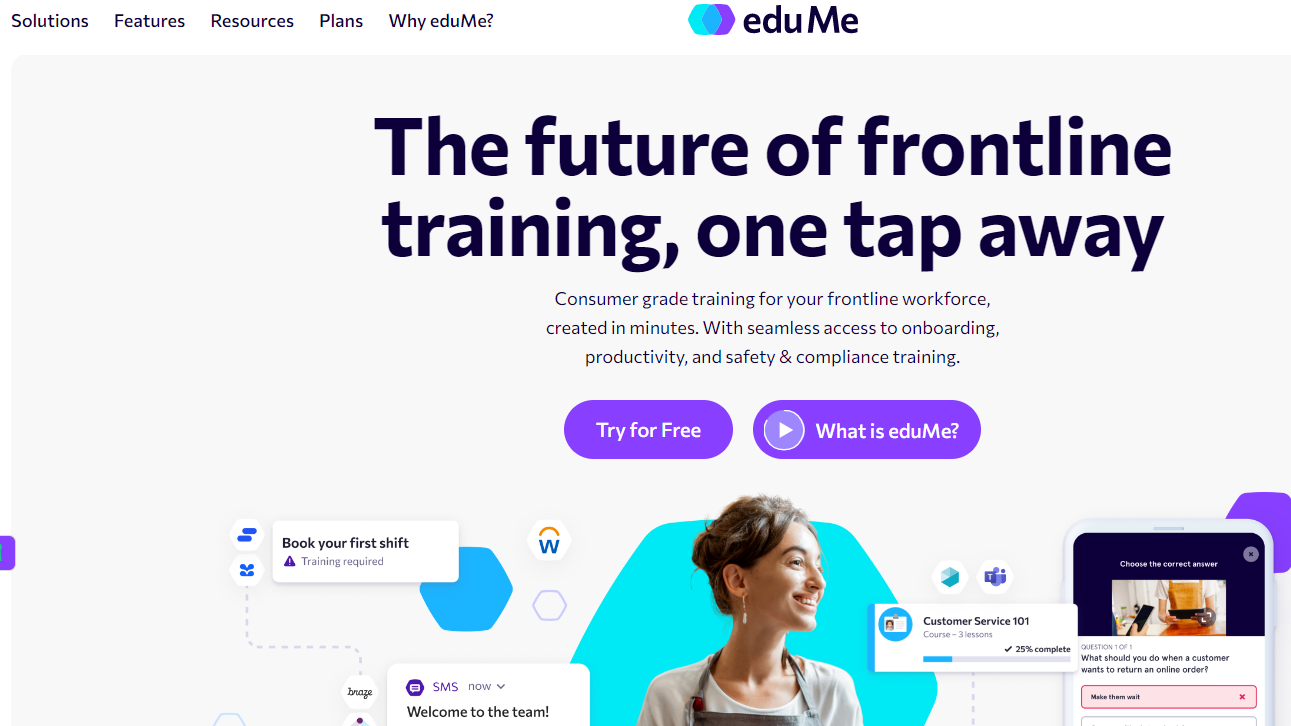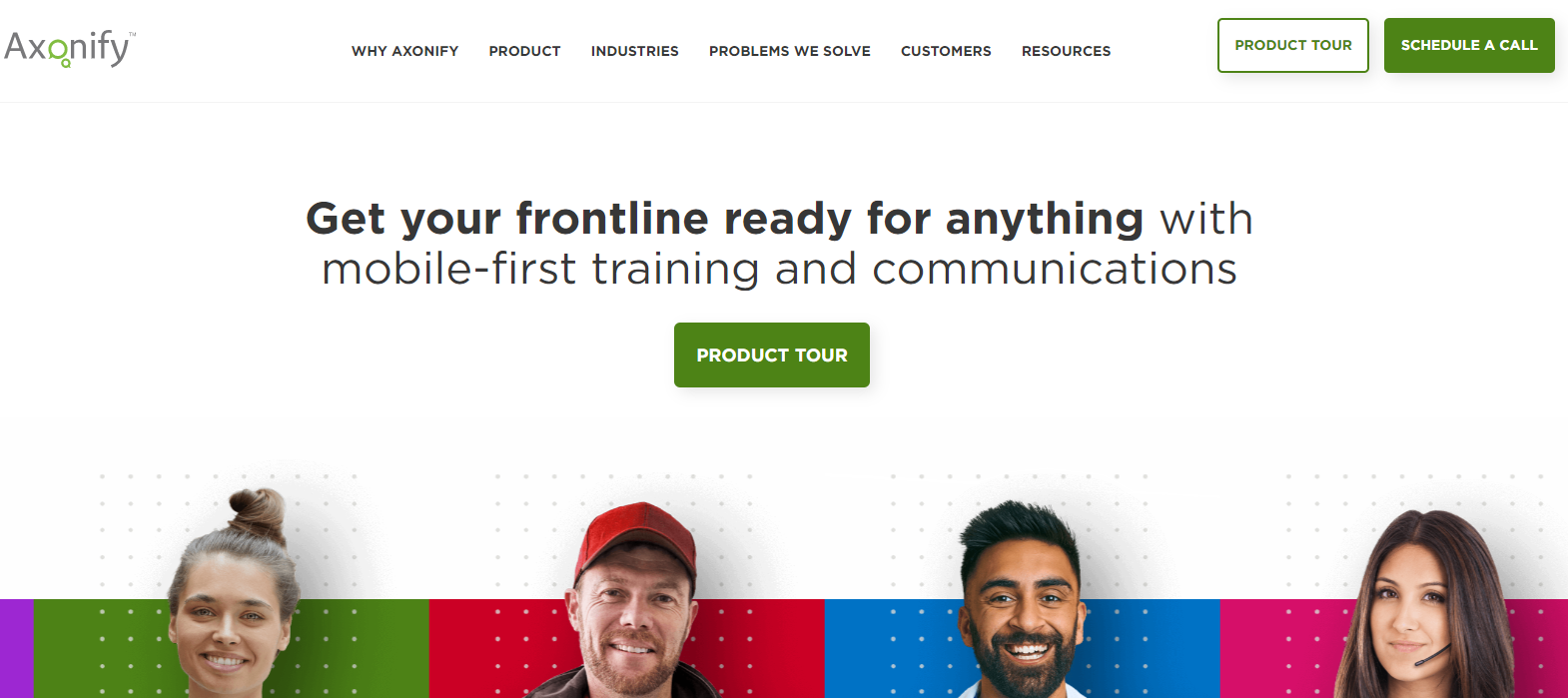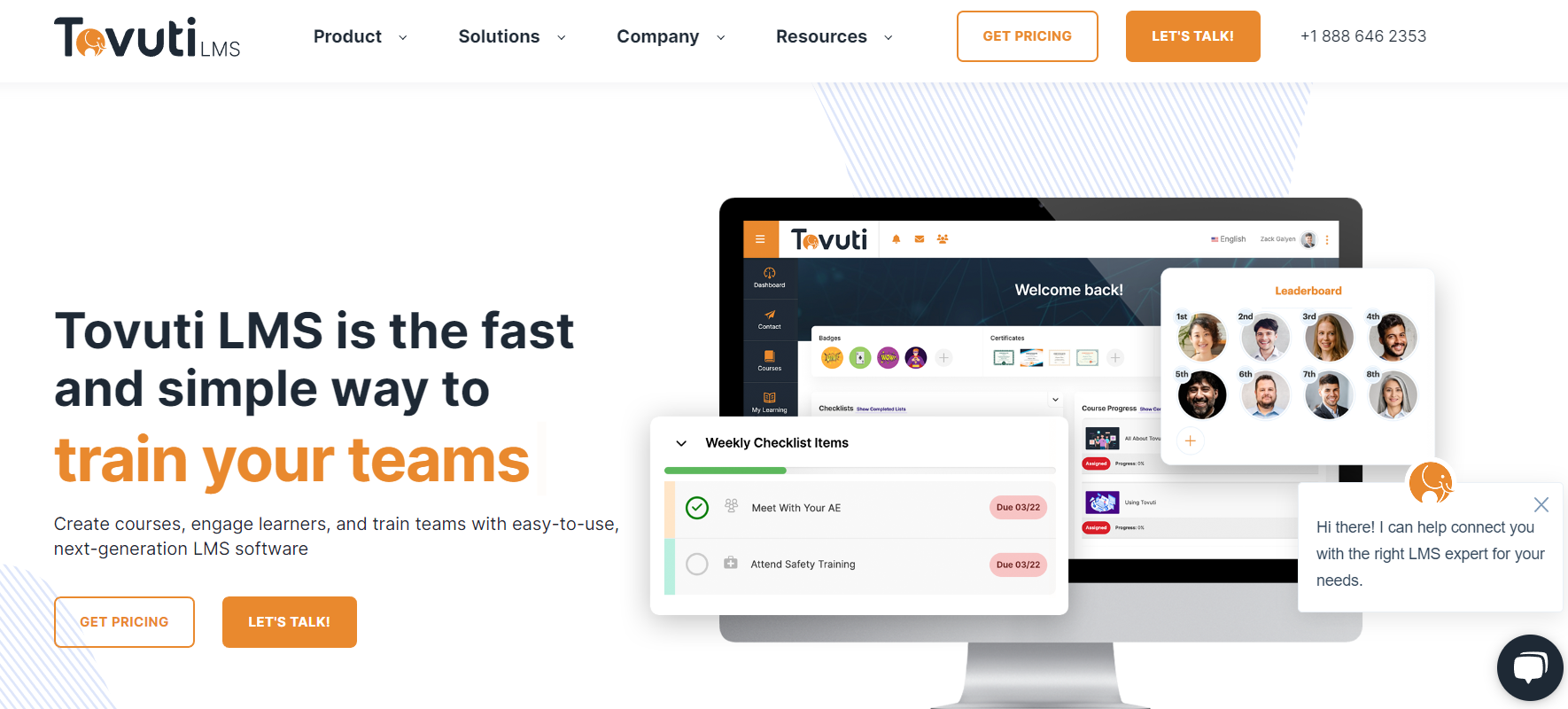14 Best Microlearning Platforms for 2023

So, you dedicate time and money to build a new training course for your employees.
And, after an arduous content review and implementation path, you see how your investment slips through your fingers when your people do not seem to retain the invaluable concepts you want to bring to them.
Frustrating, right?
Traditional training methods take a lot of work to prepare and aren’t adapted to the individual requirements that students may have.
According to these latest statistics, 58% of employees prefer to learn or train at their own speed, and 49% prefer to learn or train when necessary.
Microlearning Platforms offer an alternative to those traditional lengthy and tedious learning sessions.
They provide bite-sized lessons that are designed to deliver specific, focused information in a short amount of time, which is known as Microlearning.
With features like gamification, customizable content, collaboration, and feedback, these platforms make learning fun and are an excellent tool to improve your brand’s growth.
So, get ready to unlock your potential with Microlearning Platforms!
What Are The Best Microlearning Platforms?
We’ve explored the web to bring you the list of the best Microlearning Platforms for 2023. Whether you’re a busy professional, a student on the go, or just someone who wants a platform that makes learning entertaining and flexible, these platforms have covered you. So, what are you waiting for?
Whatfix

Whatfix is a microlearning platform that empowers users to achieve peak productivity in all their software applications. By removing obstacles to productivity, Whatfix’s Digital Adoption Platform provides in-app guidance and automation to help users complete processes step-by-step.
The platform also offers customized nudges that increase software engagement, support employees and customers, and improve results across all digital initiatives. With its user-friendly interface and extensive features, Whatfix helps organizations enhance their digital workflows and optimize productivity to meet their business objectives.
Key Benefits
- In-app guidance and automation for software applications.
- Customized nudges to increase software engagement.
- Analytics and reporting capabilities.
- Intuitive user interface.
- Multi-language support.
- Integration with a wide range of third-party tools and platforms.
- Extensive knowledge base and resources.
Pricing
Pros & Cons
Pros
Cons
Edapp

EdApp is a mobile learning platform that aims to make training more engaging and effective. With its microlearning approach, gamification features, and social learning tools, EdApp offers a range of features to help organizations deliver training that resonates with their employees.
The platform is created to be user-friendly, highly customizable, and available from anywhere, so it is a popular pick for companies of all sizes.
Key Benefits
- Access to bite-sized, engaging content from smartphones, tablets, or desktop computers whenever they’re in between tasks.
- Quickly learn what’s important in less than 5 minutes by interacting with bite-sized content.
- Turn what you have into impactful, bite-sized courses with our expert instructional designers.
- Upload your existing PowerPoint deck, and we’ll turn it into interactive lessons your team will love.
- Choose from 80+ templates built with mobile in mind, so your teams can tap, swipe, and match their way through quizzes, games, videos, and more.
- Export performance insights to out-of-the-box reports, building agile training in real-time.
Pricing
Free
$0.00 per user/mo
Plus
$2.95 per user/mo
Managed
$5.95 per user/mo
Pros & Cons
Pros
Cons
iSpring Learn

iSpring Solutions is a software development company that offers eLearning programs for businesses and educational institutions. Their solutions include iSpring Suite for the eLearning authoring tool, and iSpring Learn for the learning management system.
Key Benefits
- Create interactive courses, assessments, role-plays, video lessons, and long reads.
- Track the learner’s progress and give you an insight into the learning experience with in-depth reporting features.
- Innovative user groups with intuitive assignment and reassignment, progress reports, and other relevant data.
- Automated progress reports, notifications, and deadlines.
- Supervisor dashboards to share the overseeing task for leaders and department heads.
- Newsfeed with reactions, feedback on courses, and chat with trainers. Employee engagement
- Create video lectures by combining video with PowerPoint slides.
- Build interactive assessments with videos, drag-and-drops, branching, flexible scoring, and customizable testing rules.
- Record high-quality screencasts with spotlight mouse actions and software tutorials.
- Create interactive role-plays with branching scenarios, add voiceovers, and use built-in characters and locations.
Pros
Cons
Pricing
iSpring Learn Start
$2.99 per user/mo
50 users
iSpring Learn Business
$3.14 per user/mo
300 users
iSpring Suite
Basic
$770 per author/yr
iSpring Suite
Max
$970 per author/yr
iSpring Suite
Premium
$1970 per author/yr
Pros & Cons
Pros
Cons
7taps

7taps is a microlearning platform designed to enhance employee training and development. It offers a short learning curve, customizable learning paths, and pre-designed templates to create an engaging and practical learning experience.
Key Benefits
- No software installs.
- Built-in microlearning framework for easy creation of course material.
- Fast learning curve and simple online course building.
- 1-click accessible microlearning courses with the smoothest learner experience.
- Pre-designed templates to optimize content development time.
- Specially adapted for mobile and desktop online training.
Pricing
7taps offers three plans: a basic free plan, a Pro paid plan, and an Enterprise custom plan. For the Pro, prices start at $99 per month with unlimited users.
Pros & Cons
Pros
Cons
Qstream

Qstream offers a platform for microlearning courses to enhance knowledge retention and engagement to improve worker performance. The platform provides precision insights and analytics, coaching, and learning models that help workers fill knowledge gaps, take action to improve, and boost productivity.
Key Benefits
- Increase learning experience through a broad range of automated applications.
- Collaborate and integrate Microlearning with communication tools.
- Work with helpful management systems for employees.
- Customize business processes with automated workflows.
- Competency and engagement analytics across various learning systems and BI tools.
Pricing
Pros & Cons
Pros
Cons
Talentcards

TalentCards is a mobile training platform for deskless, frontline, and field workers designed for microlearning courses. The main goal is to learn in a fast and accessible way, with short courses that users can take anywhere at any place.
It features training topics that engage the worker with higher rates and lower average training costs. Users can design fun courses that workers will enjoy, thus speeding up learning and creating daily habits.
Key Benefits
- Remote training delivered on smartphones.
- Laser-focused training process in memorable units.
- Multimedia card sets with images, diagrams, audio, video, and hyperlinks.
- Multi-language support.
- Gamification features and offline access.
- External syncing capabilities for users’ details.
- Instant smartphone notifications.
- Dashboard performance data gathering.
Pricing
TalentCards offers three plans: a basic free plan for up to 5 users, a Standard paid plan, and a Premium custom plan. For the Standard, prices start at $50 per month with up to 50 users. For the Premium, prices start at $75 per month with also up to 50 users.
Pros & Cons
Pros
Cons
eduMe

EduMe is a mobile training platform designed to help organizations train their employees more efficiently. The platform uses various multimedia resources and immersive activities to create engaging training modules that users can access anywhere.
Key Benefits
- Mobile microlearning format.
- Gamified learning through engaging experiences.
- Surveys, feedback, and Net Promoter score.
- Creation tools that are easy to use.
- Contextual, continuous learning through embeddable course libraries
- Dedicated Customer Success Manager.
- Multiple content distribution methods.
Pricing
Pros & Cons
Pros
Cons
Grovo

Grovo is a cloud-based microlearning platform built by Cornerstone company for employee training and development. It offers a wide range of bite-sized learning modules in the most important topics and the possibility o change or create engaging content on your own through our Grovo Create tool.
Key Benefits
- Available content library in professional skills, leadership, management, and modern compliance.
- Quick and easy modification of training material to match your organization’s keywords and themes.
- Straightforward integrated authoring tool to improve complex workflows.
- Tools to track, measure and report analytics of the learning content.
Pricing
Pros & Cons
Pros
Cons
OttoLearn

OttoLearn is a microlearning app that delivers continuous, adaptive training using proven methods for improving knowledge retention. Its gamified, personalized approach prompts learners with short, 2-minute sessions that close knowledge gaps. The app also offers enterprise training features such as mobile-friendly design, rapid authoring, interactive analytics, and multilingual delivery.
Key Benefits
- Bite-sized learning modules and spaced repetition of training content.
- Adaptive learning features that fill knowledge gaps and boost knowledge retention.
- Personalized quizzes and assessments.
- Fast authoring tool to create and deliver content effectively.
- Progress tracking and reporting that automatically adapt the training to the learner.
- Security and privacy protection by encryption with industry-standard SSL.
Pricing
OttoLearn offers a Team Plan for smaller organizations that start at $250/month for up to 50 users and an Enterprise Plan for bigger organizations with up to 200 users.
Pros & Cons
Pros
Cons
LearnUpon

LearnUpon is a cloud-based LMS that enables businesses to create and deliver online courses to their employees, partners, and customers. It offers a range of features to support course creation, delivery, and tracking, as well as integrations with other software tools.
Key Benefits
- Course creation and design tailored to what your learners need.
- On-demand elearning programs with feedback at every step.
- User management with automated admin tasks.
- Hyper-focused clean interface for the best learner experience.
- Multiple training environments for different audiences.
- Powerful reporting suite to track performance effectively.
- Automated training tasks and multi-system integration.
- Webinar tools compatibility for blended learning.
Pricing
LearnUpon offers three plans: an Essential basic plan for up to 150 users, a Premium plan for up to 300 users, and an Enterprise plan for 300+ users.
Pros & Cons
Pros
Cons
Axonify

Axonify is a gamification-integrated microlearning platform built to help business employees retain essential knowledge to do their jobs. The entire platform is a no-code environment, with quick and easy interactive learning activities that the employee will enjoy with every training experience.
Key Benefits
- Embedded PowerBi to give X-API insights with zero code required.
- No code microlearning templates include games, flashcards, simulations, and role-play.
- Support for video, SCORM, and X-API.
- Available Native mobile apps and complete HTML 5 responsive web and tablet experiences design.
- Integrations with Workday, Cornerstone, SuccessFactors, Litmos, Meridian, SumTotal, Saba, SharePoint, Teams, Slack & KMS Lighthouse.
Pricing
Pros & Cons
Pros
Cons
Tovuti

Tovuti is a cloud-based LMS specializing in Microlearning. It provides a platform for businesses and organizations to create courses and train teams with easy-to-use, next-generation LMS software.
Key Benefits
- Quickly creation of courses, manuals, and other training content.
- Professionally designed themes.
- Fun and engaging learning opportunities with their website training.
- Manage training with an all-in-one LMS system.
- Enterprise-scale security and protection.
Pricing
Pros & Cons
Pros
Cons
TalentLMS

TalentLMS is a microlearning platform that creates better opportunities for companies and users. It makes them grow by providing multiple courses on different areas and contents, such as customer service applications, sales fundamentals, and informatic security.
Key Benefits
- Create brand-new courses easily, add users, and deliver in no time.
- Design courses using all kinds of digital playgrounds, such as videos, documents, and presentations.
- Create vast and varied assessments and activities like multiple choice, open questions, and quizzes.
- Guide the student through completing courses and getting access to all contents.
- Offer interactive learning courses compatible with other platforms such as Scorm, cmi5, and xAPI.
- Easily host video conferences, leave feedback, start discussions, send messages, and more.
Pricing
TalentLMS offers a range of pricing plans, starting with one for free. The Starter plan is $69/month for up to 40 users, the Basic is $149/month for up to 100 users, The Plus is $279/month for up to 500 users, and the Premium plan is $459/month for up to 1000 users.
Pros & Cons
Pros
Cons
Smartup

Smartup is a microlearning platform designed to offer a wide range of content, with the most updated digital tools that enable users to achieve the best performance.
It provides various training programs such as course development, off-the-shelf content, and multiple workshops that include finance, telecommunication, real estate, and consumer lifestyle sectors.
Smartup enhances the possibility of creating content for digital academies making your company better and more valuable.
Key Benefits
- Get your learning platform set up quickly and in a short time.
- Create learning paths with live webinars, courses, assessments, and certificates.
- Get your mobile learning app with hassle-free white labeling.
- Launch support to help you achieve maximum performance and adoption.
- Multi-language support with video translation, captioning, and dubbing
Pros
- Issue certificates upon completion of learning paths, courses, quizzes, and assessments
- Make learning accessible, enjoyable, and interactive anytime.
- Video translation, captioning, and dubbing
- Add live webinars for the best learning conditions and experience.
- Enhances thinking with quizzes while learning
- Motivates learners by converting points earned into rewards.
Pricing
Smartup provides a range of pricing plans according to the different areas where you will develop your training. Subscriptions start at USS 5 per user/month. The Trainer plan consists of 250 per month for trainers or leaders.
Pros & Cons
Pros
Cons
FAQ
What is an LMS?
A learning management system (LMS) is a software application that allows for creating, delivering, and managing online learning content.
It’s a platform that provides a central location for learners to access course materials, complete assignments, and interact with instructors or fellow learners.
However, an LMS is more than just a platform for online courses. It also includes a wide range of features and functionalities that are designed to make the learning experience more engaging and effective.
These may include features such as quizzes and assessments, discussion forums, and progress-tracking tools.
One of the key benefits of an LMS is its ability to provide a personalized learning experience to train employees. With an LMS, learners can access course materials when they want, allowing them to learn in a way that works best for them.
Additionally, an LMS can be customized to meet an organization’s or industry’s specific needs, ensuring that the content and delivery methods are tailored to the learners’ needs.
What Are Microlearning Platforms?
Microlearning Platforms are online tools that provide small, bite-sized lessons on specific topics.
They are designed to offer flexible and convenient learning experiences, with short modules that can be accessed anytime and anywhere.
Microlearning Platforms use engaging and interactive content, making it easy to learn and retain information in short bursts, making it an ideal learning method for busy professionals or students on the go.
What Are The Benefits Of Using Microlearning In Your Business?
As a business owner, you need to train your employees effectively. That’s why you should consider using Microlearning as a solution to your corporate training.
So, what are the main benefits most microlearning platforms bring to the table?
It makes learning fun!
Breaking down information into smaller chunks makes it easier for employees to stay engaged and retain information.
This is especially important for sequential course material, where each piece of information builds upon the previous one. You can use a microlearning platform to ensure your employees learn effectively and enjoyably.
It is flexible.
With these platforms, employees can access training materials at their convenience from any location. This is especially helpful for remote employees or those who work irregular hours.
By providing training this way, You can ensure that all your employees receive the information they need, regardless of their schedule or location.
It targets specific areas for improvement.
By breaking down training into small, focused lessons, you can ensure that employees learn precisely what they need to know to improve their performance.
This allows you to provide targeted training that addresses areas for improvement rather than relying on broad, generic training programs.
It is cost-effective.
Offering training materials to your entire team becomes more cost-effective when you bypass expenses tied to conventional training, like travel and accommodation.
This approach ensures top-notch training without straining your budget.
Conclusion
In wrapping up, the right microlearning platform makes learning fun and accessible.
Teams can easily dive into course content from their mobile devices and relish the freedom to create content tailored to business needs.
That’s the future of training. Embrace the change and elevate your learning experience!

